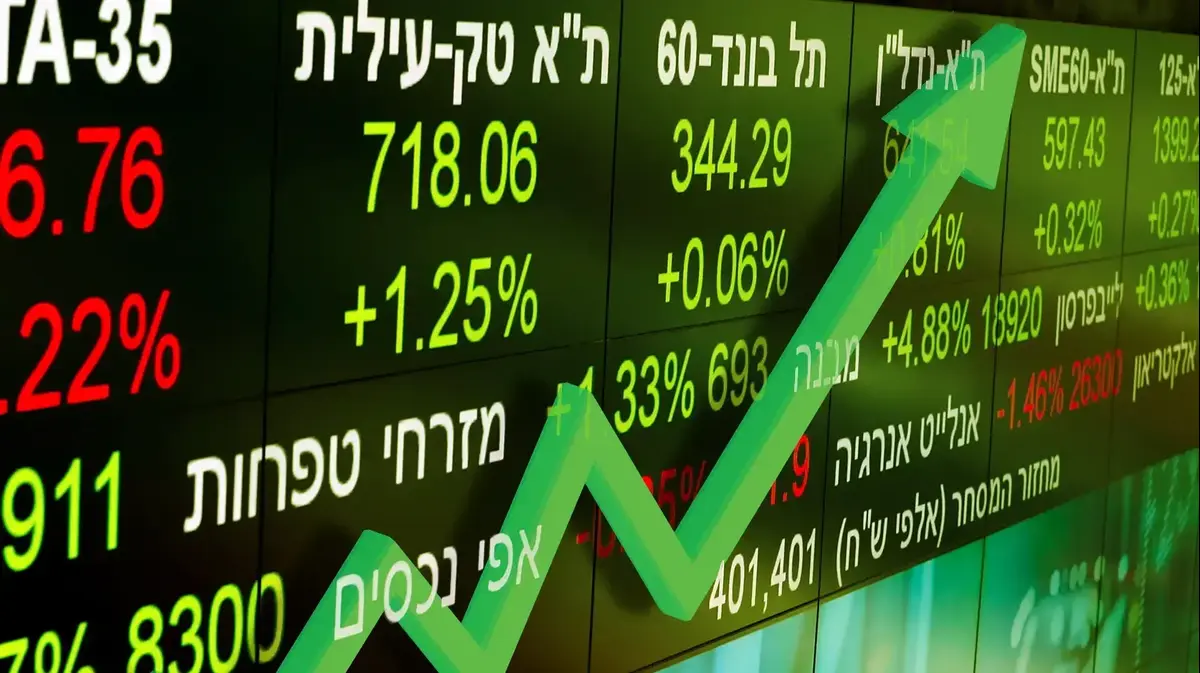Of money
All articles
Non-bank credit companies are also successful on the stock market
The return of the economy to routine has sparked a burst of credit card ironing and borrowing - both among private consumers and among businesses.
Among the beneficiaries were the non-bank credit companies, which celebrated with profits of millions of shekels.
Investors were also full partners in the celebration
Tags
credit
Moshe Kahlon
Stock Exchange
Capital Market
Roast Greenberg
Thursday, 09 September 2021, 14:37 Updated: 16:47
Share on Facebook
Share on WhatsApp
Share on general
Share on general
Share on Twitter
Share on Email
0 comments
If there is no flour, there are enough non-bank credit companies to stand in line to lend you the money to buy it - at an interest rate of tens of percent. The previously controversial activity has become a player from an institution that now complements the activities of the banks, even though the purpose of the Bank of Israel, which supervises them, was to create competition for the banks through them.
But the non-bank credit railway, initiated with the transfer of the Supervision of Financial Services (Financial Services regulated, nine years, 2016), or as it is better known, "Law Htz'iing'im", even corona could not stop.
Arrival Vaccinations and the economy's return to routine have given rise to an almost immediate need for money for their activities, and in the past year they have led the 12 non-bank credit companies traded on the Tel Aviv Stock Exchange and tested by Walla! Money to add about NIS 2.5 billion to their aggregate credit portfolio. -64.7% since June 2020 and led them to manage (together) about NIS 7 billion.
Most increased their credit portfolio to an all-time high and even found the end of 2020 and early 2021 as the best time for them to issue on the Tel Aviv Stock Exchange, and others returned the size of their credit portfolio close to its size at the end of 2019, before declining due to various corona closures.
The activity of the industry did not disappear from the kind of investors either, which led the shares of non-bank credit companies to an average increase of about 100.18% since the sharp decline they experienced with the first corona closure experienced by Israel.
More on Walla!
Fillet to shine in tomato butter by Rotem Liberzon
To the full article
The stock that climbed to the highest of the 12 companies is that of
Valio Capital One
, which has jumped about 288% since the impact of the first corona closure. The increase is mainly attributed to the announcements of the acquisition of the check discounting company 'Applichek', and its controlling shareholder, Rani Zim (57.4%), intends to purchase the assets of Psagot Investment House through the company.
The first acquisition also contributed to the highest increase in the credit portfolios of non-bank credit companies - 507.9%, which raised the portfolio to NIS 92.4 million as of the end of the first half of 2021, compared with NIS 15.2 million in the corresponding period last year.
The company, however, deepened its loss by about 7% to about NIS 3 million in the first half of the year, compared to about NIS 2.8 million loss in the first half of 2020. The deepening of the loss was due, among other things, to an increase of about NIS 1.5 million in management expenses And general in relation to the corresponding period last year, attributed to share-based payment, increase in expenses due to one-time consulting, and payment of fees to various service providers on transactions.
The closure was lifted, we went shopping, ironed - and looked for non-bank credit (Photo: ShutterStock)
Highest credit and family conflict
Despite the rise in its credit portfolio, the largest credit portfolio among the companies examined is in the hands of
the Naoi Brothers
, and stands at NIS 2.3 billion, having risen by 55.24% since the end of the first half of 2020. But it has not yet returned to pre-Corona levels. , Then stood at NIS 2.45 billion as of the end of 2019. The
company was founded by brothers Shaul and Dori Naoi, who have since quarreled, and the latter even decided to sue the former for establishing a competing company, while ostensibly still serving as CEO of Naoi.
In fact, the dispute began Already in the middle of 2020, when Shaul Nawi announced his retirement from the position of CEO of the company. A few months later his brother Dori had already raised the charges and in April this year the lawsuit was filed.
Although the rate of increase in the size of Naoi's portfolio is close to the average increase in the credit portfolio of all companies, the company's share, despite the media dispute between the brothers, jumped by about 199% in the same period, and is second after that of 'Valio Capital '.
The company also states that it intends to gradually increase its credit portfolio to a target of NIS 3 billion by March 2022, and that it is considering entering new areas through the purchase of credit portfolios
from various financing bodies.
Most of the company's credit portfolio, like that of the other companies, comes from the amount of credit provided to it by the banks and the bonds they raise on the stock exchange.
Naoi, for example, received NIS 1.8 billion in credit from banking corporations, which it sells at a higher interest rate to various businesses.
Banks: Non-bank credit card companies have become complementary services, instead of competing services (Photo: ShutterStock)
Not competition for banks but complementary service
Some argue that non-bank credit companies have become a complementary player for the banks, rather than competitors as the Bank of Israel has tried to promote. For the banks lend the money to the non-bank credit companies, which in turn lend the same money to the various businesses, while cutting a high-interest oil coupon.
Thus, the bank lends money to a stable entity such as a non-bank credit company that is committed to holding equity and reduces risk, the company transfers the money to businesses and cuts a coupon in the interval between the interest it pays to the bank and the interest it charges the businesses.
The one that has probably done this best is
Value Finance
, whose impressive jump in results has not come from a 171% increase in its share since the impact of the first corona closure, but rather from the profit it presented in the first half of 2021.
Although the profit was relatively small and stood at NIS 6.2 million, it jumped by 3,547%, compared to about NIS 170,000 profit in the first half of 2020. One of the company's best-known transactions is the one in which it lent NIS 1.3 million to the Barzani family to promote financing activities The family's cannabis business in the US. The
loan was given for 6 months, at the end of which the family was required to repay NIS 1.82 million, which is the fund along with NIS 520,000 interest, which express an annual interest rate of about 80%. The total was NIS 1.56 million, of which NIS 260,000 was interest.
Moshe Kahlon, former Minister of Finance.
The payment promised to him provoked criticism (Photo: screenshot, Ministry of Finance spokeswoman)
The minister who (so far) has not helped
But not all companies benefit. '
Joint Credit'
. For example, reported last week and a half to cut the management fees paid to
former finance minister and chairman of the company Moshe Kahlon
by 20% following the company's losses. Now they stand at 1.04 million per year, instead of 1.3 million.
Kahlon joined L'iont credit ' last June, amounting to a position of 80%, and the payment promised to him so high 8.3 million caused a public uproar.
the company and the window itself forced to withdraw the initial agreement, in light of pressure from shareholders, and the following month already reduced the package option of the new chairman volume of 4.65 million NIS 1.43 million.
Although the company reduced its losses in the first half of 2021 to NIS 5.6 million compared to a loss of NIS 6.7 million in the corresponding half last year, it ended the second quarter with a total loss of NIS 2.8 million - a 145% increase compared to the second quarter of 2020, so it stood The bottom line is a quarterly loss of NIS 1.1 million.
Capital market outlook: Decline in revenues and profits that will lead to mergers in the non-bank credit industry (Photo: Reuven Castro)
Could it be over?
There is no clear answer to the question of where the field of non-bank credit can further develop.
On the one hand, as economic activity increases, so will the need for credit provided by the field.
On the other hand, the field has become more crowded with about 7 non-bank credit companies joining the Tel Aviv Stock Exchange this year, and a few more have entered since mid-2020, also competing for credit from banks and raising capital from the public through bonds.
The capital market expects a decline in the revenues and profits of non-bank credit companies, and capital market sources estimate that some of the smaller companies will be acquired by the larger companies in the field, while others will not be able to survive the competition.
Share on Facebook
Share on WhatsApp
Share on general
Share on general
Share on Twitter
Share on Email
0 comments















